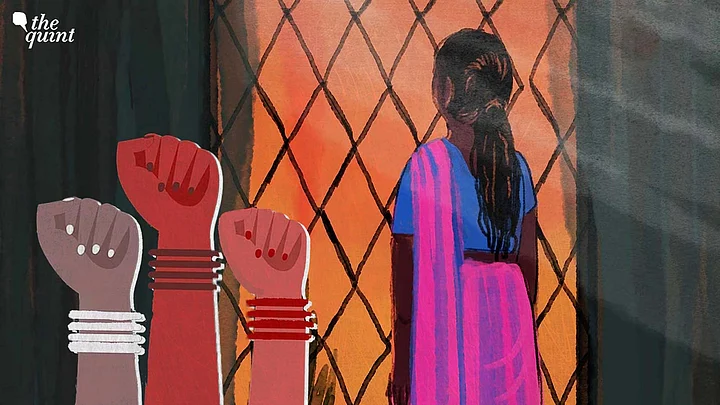"I am both a Dalit and a woman. Other than that, I became a panchayat president to lead people from varied backgrounds, including those from dominant castes. How could I have escaped harassment? Casteist slurs were hurled at me, for merely doing my duty."P Supputhayi, President, Vadugapatti town Panchayat
In a recent report by Madurai-based NGO Evidence, which focuses on the rights and welfare of Dalits and Adivasis in Tamil Nadu, as many as 114 Dalit panchayat presidents recounted their stories of severe discrimination, threats, and harassment. Out of the 114 panchayat presidents who were surveyed, 79 of them were women.
A Dalit Panchayat President Recounts Harassment
In Tamil Nadu, there are 12,609 panchayats, out of which 2,250 are reserved for Scheduled Castes.
Speaking to The Quint, P Supputhayi, panchayat president of Vadugapatti town and Dalit leader, said that she took over as the president at a time when Dalit children were forced by those from dominant castes to carry slippers on their heads as a punishment for wearing footwear to school.
"This is just a sample of the inhuman ill-treatment that people from oppressed communities are subjected to on a daily basis. I have been doing everything in my power to enable a safer space for the Dalit residents. However, in return, I am falsely accused of favoritism towards people from Dalit communities."P Supputhayi, Panchayat President of Vadugapatti town
Supputhayi recounted another incident that occurred roughly a month ago. In one of the areas in her panchayat, a dominant caste family residing near a bypass road had claimed that they owned flowering plants that had sprung up near this road. Since the area was accident-prone with the plants hindering visibility, Supputhayi visited the site and ordered to weed out the plants. The family abused Supputhayi and stopped her from doing her duty, she alleged.
"Initially, an old lady was fighting with me over cutting the plants. While I ascertained that it was my duty to ensure the safety of people in the village, she started making derogatory remarks referring to my caste and physically attacked me. Her daughter, a police officer who was also on duty at the time, started supporting her mother and abused me while she was in the police uniform. A crowd gathered in a matter of minutes and asked me to leave the spot. While I initially filed a case, I later took it back after the family provided a public apology for the demeaning behaviour."
Supputhayi alleged that she did not get the respect her official position commands. She did not take further action on those who insulted her only because her "intention was not to punish but to teach them that caste discrimination is not acceptable".
Shalin Maria Lawrence, an anti-caste activist and feminist writer, told The Quint, "A panchayat leader is responsible for the administration of a village, the identification of social and developmental needs, and the implementation of solutions and schemes that do not single out the poor and oppressed. It’s the role of the president to ensure everyone is treated equally and given welfare measures. When a Dalit becomes a president, the caste-driven societal structure in the village gets upset that Dalits get to lead and decide."
"Upper-caste women who were treating Dalit women badly are now forced to call them 'Thaliavaramma' (woman leader). The men cannot accept a Dalit woman telling them what to do. They are not used to it. This, in turn, leads to more discrimination and violence against Dalit women."Shalin Maria Lawrence, Anti-Caste Activist
Lawrence also highlighted that caste-based reservation is applicable only for the post of president and doesn’t apply to the post of vice president. This allows dominant caste representatives to get elected in every reserved panchayat.
Speaking about how caste-based discrimination never ends for a person from oppressed communities, despite their education and professional achievements, Lawrence added that there are very few Dalit Panchayat leaders. Even those who gain political power despite social inequalities are again abused by unjust caste power, she said.
Other Shocking Details
Kathir, executive director of Evidence, told The Quint that the interactions with Dalit leaders from across 19 districts in Tamil Nadu revealed shocking truths about the on-ground reality of caste discrimination.
The study conducted by his team revealed that out of the 114 panchayat presidents, 12 Dalit leaders were not allowed to hoist the national flags during days of national importance.
45 of them were denied the right to participate in temple festivals.
In 2021, a water tank was contaminated with human excrement near the Pazhaiyur ration shop. The report noted that the complaint raised by Pazhaiyur Panchayat president Vidya, who had faced threats for conducting gram sabha in a Dalit colony, was not registered.
The report urged that a youth volunteer be hired in every village and paid Rs 5,000 per month as an incentive to monitor if the programmes are successful with the populace and report back to the government. Instead of government officials, a high commission ought to be in charge of these volunteers.
The report suggested paying each Dalit Panchayat leader Rs 10,000 in salary and Rs 5,000 in pension, in addition to the state government identifying 10 best-performing panchayats and handing over Rs 25 lakh each as reward.
(At The Quint, we question everything. Play an active role in shaping our journalism by becoming a member today.)
